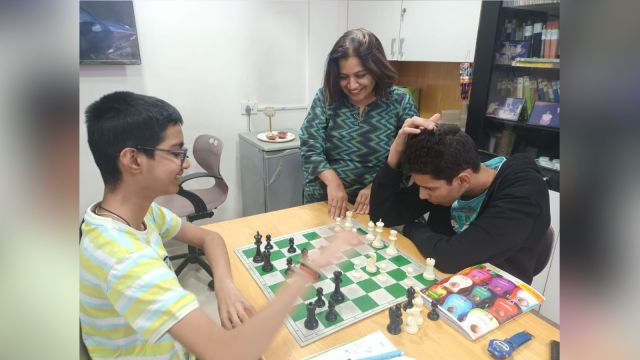Click here to join Express Pune WhatsApp channel and get a curated list of our stories
In world champion Gukesh’s footsteps: How children are taking to chess
Since the Olympiad in India in 2022, there has been an increase in the number of children taking up the board game in Pune.
 Mrunalini Kunte with students Shivam Pethkar and Aarush Budjade (in jacket) at Kunte's Chess Academy on Friday. (Express Photo)
Mrunalini Kunte with students Shivam Pethkar and Aarush Budjade (in jacket) at Kunte's Chess Academy on Friday. (Express Photo)One day during the pandemic, Mrunalini Kunte, Woman International Master 2000, and her brother, chess Grandmaster Abhijit Kunte, started discussing the younger generation of players. The latter had said, “Gukesh has a lot of spark and is somebody to watch.” Mrunalini was among those present during the 2022 Chess Olympiad when Gukesh achieved eight straight wins and shot into the public imagination. “What I liked was the maturity and confidence that he shows. Now, at the age of 18 years to become the youngest world chess champion is a tremendous and very difficult achievement,” says Mrunalini, seated around chess boards at the Kunte’s Chess Academy in Kothrud. On Thursday, all the coaches and the staff at the school had gone out for dinner to celebrate the new champion.
Since the Olympiad in India in 2022, there has been an increase in the number of children taking up the board game in Pune. Trainers expect the game to get another fillip with Gukesh’s win. Aarush Budjade and Shivam Pethkar, both in Class VIII, sat over their boards at Kunte’s Chess Academy on Friday afternoon. Around them, rows of tables are ready with chess boards set with pieces ready to go into battle. The glass partitions of the academy are painted with quotes, such as “Winning isn’t everything… but losing is nothing” by Edmar John Mednis.
Budjade started playing with his grandmother at an early age and became interested in the game. “I am home-schooled and am planning to study chess,” he says. Pethe, who started playing against his uncles, reads books on chess and dreams of following in Gukesh’s footsteps. When the academy, among Pune’s best, was set up in 2007, there were eight students. There are 200 students now in three centres.
“When we were growing up in Pune, there were hardly any academies or proper chess training centres. At present, you can see a lot of people are getting into chess coaching and a lot of kids are also getting into playing. We had to teach the children the basics at our academy, including the names of the pieces, even a few years ago. The new generation of students already comes with the knowledge of how to move pieces. They have learned the basics as they are already playing online or with their parents. They know about players unlike before when we talked only about Viswanathan Anand. That is a huge change,” says Mrunalini.
There would be more children and from across socio-economic levels if there were more sponsorships and support. At the beginning, chess is not very expensive. Things get challenging when the children have to travel for various tournaments outside Pune. “Chess is different from most other sports. Unlike swimming for instance, chess can be played for hours together by the children. Gukesh has won at the age of 18. That is something not possible in many other sports, where a player of a particular age plays in the same age category. A chess player, on the other hand, can play in the open category and defeat older players. There is no physical constraint. It is only about how they are able to think and calculate,” says Mrunalini.
She says that parents are becoming open to the idea of children dedicating their time to sports, but the change is not widespread. “A lot of parents feel that their child should excel in everything, but that is not possible. We can see that some kids are really good at chess but the parents want them to perform well in their schools as well and rank in the top three. We see that children are trying to manage everything and are under a lot of pressure,” she says. If the academy takes in 100 admissions in a year, they see 50 per cent of the children have come because their parents want them to play chess. A quarter of the children become hooked to the game while the rest drop out in a few months.
Then, there is the attitude to failure and success. The coaches have to regularly tell parents that chess is a game where, even if a player is very good, “somebody will be first and somebody will be last”. “A lot of parents and children lose interest. It is important that, even if you are last, you still maintain interest and try to climb the ladder,” says Mrunalini. That’s what Gukesh would have done.
Click here to join Express Pune WhatsApp channel and get a curated list of our stories








